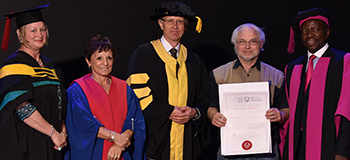Latest News Archive
Please select Category, Year, and then Month to display items
29 August 2024
|
Story Anthony Mthembu
|
Photo Harmse Photography
 Ross van Reenen, CEO of the Toyota Free State Cheetahs.
Ross van Reenen, CEO of the Toyota Free State Cheetahs.
The Business School at the University of the Free State (UFS) recently hosted the CEO of the Toyota Free State Cheetahs, Ross van Reenen, for a guest lecture. Van Reenen presented the guest lecture in the Business School Auditorium on the UFS Bloemfontein Campus on 21 August 2024.
Reflecting on Van Reenen’s address
In a lecture addressed to an auditorium filled with UFS staff and students, Van Reenen’s talk was divided into several sections. Firstly, he spoke about the concept of the ‘black swan’ in reference to the book written by Nassim Nicholas Taleb, titled The Black Swan: The Impact of the Highly Improbable. Referring to Taleb’s book, Van Reenen defined a ‘black swan’ as a rare event that has a severe impact, and the occurrence of which people try to explain. He used some examples to explore this concept as well as its implications, including COVID-19 and its impact on the world, and the tragic death of the people in the Titanic disaster. However, he delved deeper into 9/11 and the extent of its impact, saying that “9/11 was a major wake-up call in the world economy”. Van Reenen highlighted how some companies such as Barclays, for which he previously consulted, had to work to be up and running after the collapse of the Twin Towers in 9/11.
In addition, Van Reenen’s lecture also touched on the importance of the first ninety days of a job after an individual has been employed. “Those first ninety days are crucial, as you have to establish yourself in a company where you are paid less than you are worth,” Van Reenen said. As such, he gave the audience insight into what they could focus on in that time frame. This includes focusing on the small wins, as well as ensuring that you are working at keeping the team together, as the team is an integral part of an organisation.
Van Reenen concluded his address by speaking about his time as the CEO of the Toyota Free State Cheetahs, including some of the decisions he took to ensure the success of the organisation.
Community builders honoured at Community Engagement Awards
2016-10-13

Photo: Charl Devenish
The office of Community Engagement held its annual Community Engagement Awards at the University of the Free State (UFS) on 5 October 2016. This year, the ceremony celebrated people who gave themselves selflessly to improve the lives of those around them who are less privileged. Key players in various sectors of society were recognised and honoured for their contribution and commitment towards a common good.
Dr Richard Teare, president of the Global University for Lifelong Learning (GULL), was the keynote speaker at the ceremony. GULL, a non-profit foundation, operates across the world, providing access to lifelong learning for communities, giving each individual an opportunity to make a difference in their world. Dr Teare talked of places that lack the provision and infrastructure to access higher education and said that through community service programmes, social and economic development was enhanced, and the necessary expertise and resources were provided to drive a community towards a greater good. “Community engagement espouses academic excellence—it enables people to discover their full potential.”
Through its partnership with GULL, the University of Free State has worked with women from Bloem Shelter, an organisation that provides assistance to underprivileged women and children from diverse walks of life. The women were equipped with the necessary skills and knowledge they needed to become self-sufficient - an experience that has yielded positive, constructive change in the women’s lives.
The awards also acknowledged the boldness and innovative support of members of the Free State community in their various sectors. Among those awarded was Dr Choice Makhetha for her contribution in building capacity for those involved in community service programmes. She also designed and created approaches to improve situations in schools, churches, community organisations and small businesses. Also presented with an award was Dr Dipane Hlalele of the Qwaqwa Campus for his role as principal investigator in two National Research Foundation (NRF) -funded projects; Rural Relational Leadership and Sustainable Rural and Urban Connection. The ICT Innovation in School Education division of the South Campus was also recognised for its Internet Broadcast Project (IBP), which provides lessons on different subjects to 72 000 learners and 3 000 teachers each week.